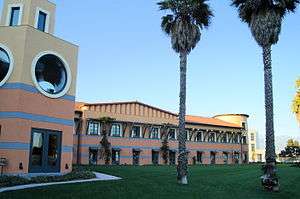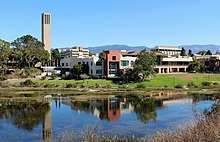Kavli Institute for Theoretical Physics
The Kavli Institute for Theoretical Physics (KITP) is a research institute of the University of California, Santa Barbara. KITP is one of the most renowned institutes for theoretical physics in the world, and brings theorists in physics and related fields together to work on topics at the forefront of theoretical science. The National Science Foundation has been the principal supporter of the Institute since it was founded as the Institute for Theoretical Physics in 1979. In a 2007 article in the Proceedings of the National Academy of Sciences, KITP was given the highest impact index in a comparison of nonbiomedical research organizations across the U.S.[1]
| Established | 1979 |
|---|---|
Field of research | Theoretical physics |
| Director | Lars Bildsten |
| Location | Santa Barbara, California, United States |
| Campus | University of California, Santa Barbara |
| David Gross Walter Kohn Robert Schrieffer Frank Wilczek |
About
In the early 2000s, the institute, formerly known as the Institute for Theoretical Physics, or ITP, was named for the Norwegian-American physicist and businessman Fred Kavli, in recognition of his donation of $7.5 million to the Institute.
Kohn Hall, which houses KITP, is located just beyond the Henley Gate at the East Entrance of the UCSB campus. The building was designed by the Driehaus Prize winner and New Classical architect Michael Graves, and a new wing designed by Graves was added in 2003–2004.

Members
The Directors of the KITP since its beginning have been:
- Walter Kohn, 1979–1984 (Nobel Prize in Chemistry, 1998)
- Robert Schrieffer, 1984–1989 (Nobel Prize for Physics, 1972)
- James S. Langer, 1989–1995
- James Hartle, 1995–1997 (Einstein Prize (APS), 2009)
- David Gross, 1997–2012 (Nobel Prize in Physics, 2004)
- Lars Bildsten, 2012–present
The Director and the permanent members of the KITP (Leon Balents, David Gross, Alexei Kitaev, and Boris Shraiman) are also on the faculty of the UC Santa Barbara Physics Department. Former permanent members include Physics Nobel Laureate Frank Wilczek and Joseph Polchinski.
